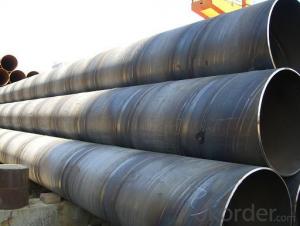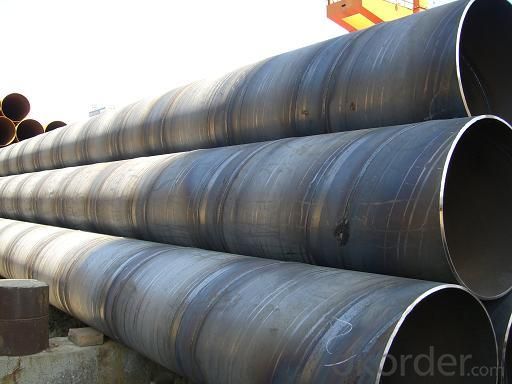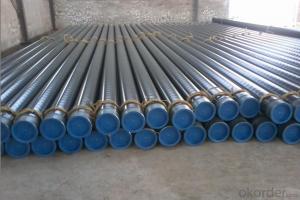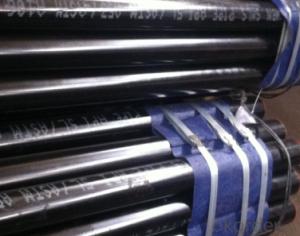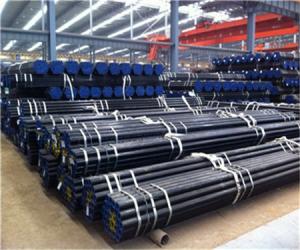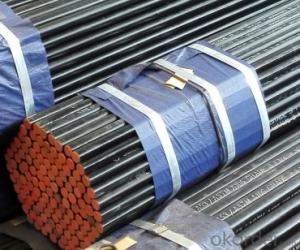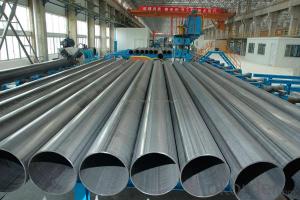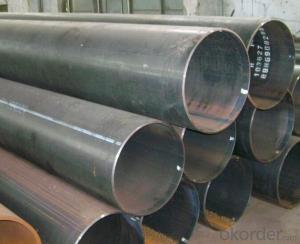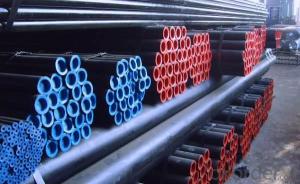SSAW STEEL PIPE ASTM A53 ASTM A106
- Loading Port:
- China Main Port
- Payment Terms:
- TT OR LC
- Min Order Qty:
- -
- Supply Capability:
- -
OKorder Service Pledge
OKorder Financial Service
You Might Also Like
Packaging & Delivery
Packaging Detail: | standard export packing or as customer's requirement |
Delivery Detail: | within 10 - 30 days |
Specifications
Spiral Welded Steel Pipes and Tubes
1.Material:Q195-Q235
2.Length:1-12m
3.WT:1.0-14mm
4.O.D.:20-273mm
Spiral Welded Steel Pipes and Tubes
Product Description:
1.Material : Q235,Q345,L245,L290,L360,L415,L450,L485,GrB,X42,46,X52,X56,X60,X65,X70,X80,X100
2,Standard: SY/T5037-2000,GB/T9711-2011,API Spec 5L PSL1/PSL2,ASTM A252\A53,ISO3183,DIN17172,EN10217,JIS G3457,AWWA C200,ASTM A139,ASTM A671,ASTM A672
3.Wall thickness: 3.0mm-30mm
4.Outer diameter: φ168mm-3020mm
5,Length: 5m-12m or as your requirement
6,Corrosion protection standard: DIN30670,DIN30671, AWWAC210, AWWA C203, SY/T0413-2002,SY/T0414-2002
7,Application: Oil, gas, natural gas, water pipe, thermal electricity pipe, steel structure engineering, etc
Q195-q345 Material Steel Pipe's Materials
Elements | Chemical Compsition% | Mechanical Property | ||||||
| C% | Mn% | S% | P% | Si% | Yield Point (Mpa) | Tensile Strength(Mpa) | Elongation |
Q195 | 0.06-0.12 | 0.25-0.50 | <0.050 | <0.045 | <0.030 | >195 | 315-430 | 32-33 |
Q215 | 0.09-0.15 | 0.25-0.55 | <0.05 | <0.045 | <0.030 | >215 | 335-450 | 26-31 |
Q235 | 0.12-0.20 | 0.30-0.70 | <0.045 | <0.045 | <0.030 | >235 | 375-500 | 24-26 |
Q345 | <0.20 | 1.0-1.6 | <0.040 | <0.040 | <0.55 | >345 | 470-630 | 21-22 |
- Q: How do you calculate the pipe volume flow rate for steel pipes?
- The pipe volume flow rate for steel pipes can be calculated using the formula: V = A * V_avg, where V is the volume flow rate, A is the cross-sectional area of the pipe, and V_avg is the average velocity of the fluid flowing through the pipe.
- Q: Can steel pipes be used for conveying sewage and wastewater?
- Yes, steel pipes can be used for conveying sewage and wastewater. Steel pipes are known for their strength, durability, and resistance to corrosion, making them suitable for transporting various types of fluids, including sewage and wastewater. Additionally, steel pipes can withstand high pressure and are capable of handling the abrasive and corrosive nature of sewage and wastewater, making them a reliable choice for such applications.
- Q: How do steel pipes perform in extreme weather conditions?
- Steel pipes are highly resilient and perform exceptionally well in extreme weather conditions. They have excellent resistance to corrosion, impact, and temperature variations, making them ideal for withstanding harsh environments such as extreme heat, cold, and heavy rainfall. Moreover, steel pipes are known for their durability and strength, ensuring that they can withstand the forces exerted by high winds, snow, and even seismic activities. Overall, steel pipes are a reliable choice for various applications in extreme weather conditions.
- Q: Can steel pipes be used for irrigation systems?
- Yes, steel pipes can be used for irrigation systems. Steel pipes are known for their durability, strength, and resistance to corrosion, making them suitable for use in irrigation systems where they may be exposed to water and various environmental conditions. Additionally, steel pipes can handle high water pressure and are available in different sizes, allowing for efficient water distribution throughout the irrigation system.
- Q: How are steel pipes used in the manufacturing of appliances?
- Steel pipes are commonly used in the manufacturing of appliances as they provide a durable and reliable solution for various applications. They are used for carrying fluids, gases, and even electrical wiring within appliances due to their high strength and resistance to corrosion. Additionally, steel pipes are also utilized for structural support and framing, ensuring the stability and longevity of appliances.
- Q: How do you prevent corrosion in steel pipes?
- One effective way to prevent corrosion in steel pipes is by applying a protective coating, such as paint or epoxy, to the surface of the pipes. This barrier creates a physical barrier between the pipe and the surrounding environment, preventing moisture and corrosive agents from coming into direct contact with the steel. Additionally, regular inspection and maintenance of the pipes, including cleaning and repairing any damaged coating, can help identify and address potential issues before they lead to corrosion.
- Q: What are the main components of a steel pipe?
- The main components of a steel pipe are the pipe body, which is made of steel and provides structural strength and durability, and the pipe ends, which can be either threaded or plain and are used for connecting and joining the pipe to other components or systems. Additionally, steel pipes may also have protective coatings or linings to enhance corrosion resistance and prolong their lifespan.
- Q: Can steel pipes be used for paper mills?
- Yes, steel pipes can be used for paper mills. Steel pipes are commonly used in paper mills for various purposes such as transporting fluids, chemicals, and steam within the facility. They are known for their durability, strength, and resistance to corrosion, making them suitable for the harsh conditions and high-pressure requirements of paper mill operations.
- Q: What are the different grades of steel used in manufacturing pipes?
- There are several grades of steel used in manufacturing pipes, including carbon steel, alloy steel, stainless steel, and duplex steel. Each grade has distinct properties and characteristics that make it suitable for different applications and environments.
- Q: What are the different testing methods used for steel pipes?
- There are several testing methods used for steel pipes to ensure their quality and reliability. Some of the commonly used testing methods include: 1. Non-destructive Testing (NDT): NDT methods such as ultrasonic testing, magnetic particle inspection, and liquid penetrant testing are used to detect any surface or subsurface defects in the steel pipes without causing any damage to them. 2. Mechanical Testing: Mechanical testing involves conducting various tests to evaluate the mechanical properties of steel pipes, including tensile strength, yield strength, elongation, hardness, and impact resistance. These tests help determine the structural integrity and performance of the pipes. 3. Hydrostatic Testing: This method involves subjecting the steel pipes to high-pressure water to check their ability to withstand the expected operating conditions. Hydrostatic testing is performed by filling the pipes with water and pressurizing them to a predetermined level for a specified duration. Any leakage or deformation in the pipes is detected during this test. 4. Dimensional Inspection: This testing method ensures that the steel pipes meet the specified dimensional requirements. It involves measuring the diameter, wall thickness, length, and other critical dimensions of the pipes to verify compliance with the applicable standards or specifications. 5. Visual Inspection: Visual inspection is a basic method used to assess the external appearance of steel pipes. Trained inspectors visually examine the pipes for any surface defects, such as cracks, corrosion, or irregularities in shape or finish. 6. Chemical Analysis: Chemical analysis is performed to determine the composition and elemental content of the steel pipes. It helps ensure that the pipes are made from the correct grade of steel and meet the required chemical composition standards. 7. Metallographic Examination: Metallography involves examining the microstructure of steel pipes under a microscope to assess their quality and integrity. It helps identify any internal defects, such as grain boundaries, inclusions, or improper heat treatment, that may affect the overall performance of the pipes. By utilizing these testing methods, manufacturers and inspectors can ensure that steel pipes meet the necessary quality standards and are suitable for their intended applications.
Send your message to us
SSAW STEEL PIPE ASTM A53 ASTM A106
- Loading Port:
- China Main Port
- Payment Terms:
- TT OR LC
- Min Order Qty:
- -
- Supply Capability:
- -
OKorder Service Pledge
OKorder Financial Service
Similar products
Hot products
Hot Searches
Related keywords
